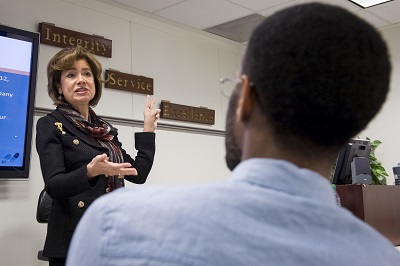
Maria Contreras-Sweet took office of administrator of the U.S. Small Business Administration (SBA) on April 7th. Contreras-Sweet took little time to get started. And in her first few weeks, she has already made efforts to show Veterans that they are a priority for her and her tenure as head of the SBA.
On April 15, Contreras-Sweet met at the Pentagon with service members who are enrolled in the SBA’s “Operation Boots to Business” program. The program is the product of a coalition between the SBA, the DOD, the VA and Syracuse University that provides transitioning service members with the knowledge and resources to succeed as entrepreneurs. The new SBA head spoke to a class of 20 transitioning airmen and sailors who are seriously considering starting their own businesses.
Contreras-Sweet relayed to the Boots to Business group the need for Veteran businesses to succeed. After all, there are currently almost 2.5 million Veteran owned businesses in the U.S. that employ a combined 5.8 million employees. Veteran owned businesses comprise 9% of all U.S. small businesses. But on top of all that, Conteras-Sweet told the group that she wants to make certain that those who served their country also get a chance to prosper after their service.
To provide an example of her previous record with assisting Veteran entrepreneurs, Contreras-Sweet spoke to the group about her time spent leading the California Business, Transportation and Housing Agency. Contreras-Sweet said that whenever her agency was hiring out contracts, she always made sure that contracts were provided for Veteranowned companies.
“There’s no point in getting people ready for business and then not giving them the opportunity to do the business,” she told them, “particularly with the government that they fought so hard to defend.”
Contreras-Sweet reminded the future Veteran entrepreneurs, that companies including: FedEX, Chik-Fil-A, Nike and Proctor & Gamble were all started by Veteran entrepreneurs. The SBA administrator believes that there is no coincidence that these Veteran owned businesses became the industry giants they are today. She told the group that many skills that they learned and honed in the military can translate to civilian jobs. At the top of these skills is leadership.
“…your service has given you unique qualifications to lead, and leadership is the holy grail of entrepreneurship,” Contreras-Sweet said.
The administrator promised the Operation Boots to Business group that the SBA would do all that they could to help their businesses get off the ground and grow.
“I want the SBA to have a long-term relationship with you,” she said. “And I want you to tell me if something works or doesn’t work. I want to hear from you directly about how the SBA can do more and how we can do better.”
VAMBOA: New SBA Head Encouraging Veteran Business Owners









